When I refer to Hospitals, I mean conducting Connected We Play sessions aimed not only at employees (doctors and nurses), staff who live constantly under stress and on the verge of burnout. In Rome, and in other Italian cities, therapeutic laughter has also found its place in spaces reserved for cancer patients or relatives who support their sick loved ones, to give an extra boost, given the heavy load to which they are subjected. This activity showed to be very useful to distract the mind from thoughts bordering on despair, to be able to help the person for whom they are there more effectively, giving real support with their presence. Lingering in negativity certainly leads nowhere: with the activity I propose you can take the opportunity to distract your mind from that loop to recharge and compare yourself with people passing through the same experience, putting aside worries for that juncture, regenerating a little and pausing from affliction for a while that, in any case, doesn’t benefit the hospitalized patient.
Benefits for cancer patients:
with the stimulation of the production of feel-good hormones, the stress and fear related to the diagnosis is removed;
it promotes a positive outlook because laughter relieves depression, especially when practiced with a peer group;
it helps relieve pain thanks to the release of endorphins that occurs during the practice, up to two hours after the end of the session;
better oxygenation of the body and increase in NK cell production.
Doctors and nurses benefit greatly from the sessions.
A doctor who attended one of my clubs in Thermi, Thessaloniki, told me that in the hospital it would be desirable at least two sessions a week to help the staff remove the danger of nervous breakdown, given the rhythms to which they are subjected.


The first result is the reduction of stress in a very evident way. I like to challenge some categories like these, which are used to doing a lot of intellectual work: with mental gymnastics exercises or with others that I practiced when, as a teenager, I attended the Scouts, I have seen some of these people literally melt away with laughter who, in doing their work, are forced to maintain a certain aplomb, like doctors. This helped them mitigate their skepticism about the goodness of this practice and to dispel much of the stress with which they had presented themselves at the beginning of the session. And dealing with a doctor with a relaxed face, as a patient, I certainly find it preferable: it gives me more security, regardless of what he has to communicate to me.
In Italy, in Florence, the San Giovanni di Dio Hospital has provided its employees with a 20-hour course in order to learn to laugh unconditionally and increase resistance to stress. In the International Journal of Nursing of June 2019, a research carried out on Laughter Therapy on psychiatric nurses at risk of burnout is reported. The study demonstrated the validity of unconditional laughter, and confirmed the activation of some physiological and psychological changes: reduction of stress, anxiety and tension, elevation of mood, self-esteem, energy and vitality, improvement of memory, creative thinking and problem resolution, improvement of interpersonal relationships, increase in friendliness and availability, sense of relaxation and effects on pain thresholds. Also promotion of psychological well-being.



